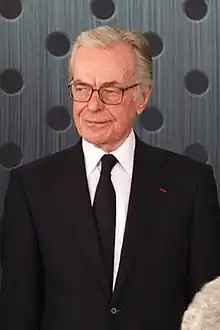Jacobo Zabludovsky
Jacobo Zabludovsky Kraveski (May 24, 1928 – July 2, 2015) was a Mexican journalist.[1] He was the first anchorman in Mexican television and his TV news program, 24 Horas (24 Hours) was for decades regarded as the most important in the country.[2]
Jacobo Zabludovsky | |
|---|---|
 | |
| Born | Jacobo Zabludovsky Kraveski May 24, 1928 Mexico City, Mexico |
| Died | July 2, 2015 (aged 87) Mexico City, Mexico |
| Occupation | Journalist |
| Spouse | Sara Zabludovsky (née Sara Nerubay) |
| Children | Abraham Zabludovsky Nerubay (journalist) |
| Relatives | Abraham Zabludovsky (architect), brother |
Early life
Zabludovsky was born in 1928 in Mexico City to Polish Jewish immigrants.[3] He was the brother of Abraham Zabludovsky (1924-2003), a famous architect.
Career
Zabludovsky was a well known anchor man hosting 24 Horas, the main news program on the popular Televisa network between 1970 and 1998.[2] Owing to the nonconfrontational approach of the network, the programme was perceived as partisan and supportive of the government.[2][4][5]
In 1998, citing a desire to cut down his workload and ill-health, he retired from presenting 24 Horas, which also came to an end with his departure, marking the end of an era in Mexican journalism.[6] After leaving 24 Horas, Zabludovsky worked on special newscasts and documentaries.[4] However, in 2000, he resigned from the Televisa network following the resignation of his son, Abraham, who also worked for Televisa.[4] Zabludovsky claimed that his son had been overlooked for the position of night time news anchor and that he was resigning out of solidarity with him.[4]
During his career at Televisa, Zabludovsky covered several important issues. He was one of the few Mexicans reporting in Cuba the day Fidel Castro entered Havana in 1959 during the overthrow of the Batista dictatorship and reported from his car phone (at that time these car phones were the only mobile phones in Mexico and were a luxury item), and reported on the 1985 earthquake that destroyed several parts of Mexico City.[6] However, there was criticism of his coverage of presidential elections in 1988 and 1994, when he favored the candidate of the government party to the exclusion of opposition contenders.[7][8] He interviewed many notable people, including President Ernesto Zedillo,[9] Salvador Dalí and María Félix.
Eighteen months after leaving television, he began a radio newscast on a new station, La 69 at Grupo Radio Centro, with the pledge of being more critical "...in agreement with the new Mexico in which we are living.".[10] Beginning on March 3, 2004, the newscast was also broadcast on Radio Red AM and Radio Red FM. Zabludovsky hosted the newscast until June 22, 2015, being hospitalized shortly after.
From 2007 until 2015, he also wrote "Bucareli", a weekly column for Mexican nationwide newspaper El Universal.
In 2009, his voice appeared in Up!, a Disney-Pixar film.[11]
Zabludovsky returned to television in 2012 as part of ESPN Deportes and ESPN Mexico's coverage of the 2012 Summer Olympics, he was also part of the network's coverage of the 2013 FIFA Confederations Cup the following year.[12][13] On June 2, 2015, exactly one month before his death, Zabludovsky covered the historic match between the Cuba national football team and the New York Cosmos in Havana, Cuba.[14] The match marked the first time an American sports team visited Cuba after the United States began normalizing relations with the island nation.[15]
He is the subject of Molotov's song Que No Te Haga Bobo Jacobo (Don't let Jacobo make a fool out of you), where he is accused of receiving bribes from Carlos Salinas and negotiating the news with the government.[16][17] In a 2013 interview, Zabludovsky said about the song: "I have never heard it, I don't know if it's offensive, but if it was, they have the right to express what they think.".[18]
Death
Zabludovsky died of a stroke[3] caused by dehydration at the age of 87 in Mexico City on the morning of July 2, 2015. He was buried at Mexico City's Israelite (Jewish) Cemetery that afternoon. He is survived by his wife Sara and three children[3]
References
- "Mexican TV Anchor Jacobo Zabludovsky Dies at 87". ABC News. July 2, 2015. Retrieved 2 July 2015.
- Rohter, Larry (1990-06-24). "As the world turns, it's news with a spin; Mexico: The Word According To Jacobo". New York Times. Retrieved 2007-11-25.
- "Jacobo Zabludovsky, Longtime Anchor for Mexico's Televisa, Dies". Wall Street Journal. Retrieved 2 July 2015.
- Preston, Julia (2000-04-01). "In Mexico, Top Newsman And Network Part Ways". New York Times. Retrieved 2007-11-25.
- Depalma, Anthony (1994-03-06). "Press in Mexico docile on revolt". New York Times. Retrieved 2007-11-25.
- Preston, Julia (1998-01-20). "Mexico City Journal; News (and State) Anchor Weighs His". New York Times. Retrieved 2007-11-25.
- Rohter, Larry (1988-07-16). "Press To Many, Mexican Press Is Meek . . ". New York Times. Retrieved 2007-11-25.
- Golden, Tim (1994-07-23). "Mexican TV Picks Its Political Shots". New York Times. Retrieved 2007-11-25.
- Dillon, Sam (1996-08-15). "Mexico's New Press Boldness Stops at Leader's Desk". New York Times. Retrieved 2007-11-25.
- Vértiz, Columba (2001-09-01). "Zabludovsky aboga ahora por la libertad de prensa" (in Spanish). Proceso. Archived from the original on 2008-03-02. Retrieved 2007-11-25.
- About Zabludovsky's voice in Up! (Retrieved July 10, 2017)
- Rocher, Sofia (2012-03-20). "Confederations Cup 2013 on ESPN Deportes". ESPN MediaZone. Retrieved 2017-06-01.
- "Jacobo Zabludovsky llegó a ESPN". ESPN Deportes. 2013-06-13. Retrieved 2017-06-01.
- "ESPN ThisWeek – May 27, 2015". ESPN MediaZone. 2015-05-27. Retrieved 2017-06-01.
- Lewis, Michael. "New York Cosmos beat Cuba in historic friendly match: 'The doors are open'". The Guardian. Retrieved 2017-06-01.
- "Will Young Rockers Really Rock the Boat?", Bloomberg
- Molotov Que no te haga bobo Jacobo Lyrics Archived 2008-03-01 at the Wayback Machine
- Jacobo Zabludovsky: con Dios y con el diablo(in Spanish)